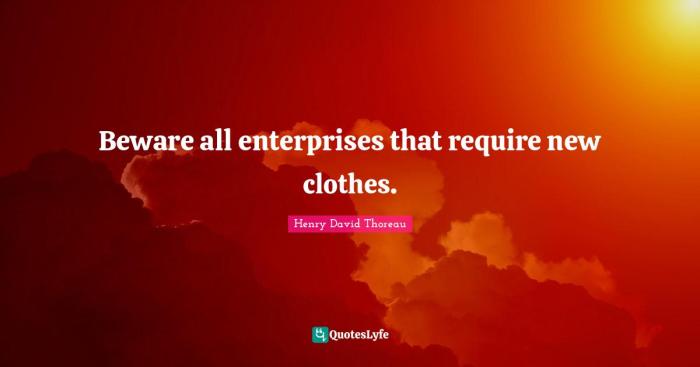Beware all enterprises that require new clothes. This adage, often attributed to Henry David Thoreau, serves as a cautionary tale against the perils of conformity and the importance of individuality. In a world increasingly driven by consumerism and the pursuit of material possessions, Thoreau’s words offer a timely reminder of the dangers of sacrificing our values and authenticity in the name of fitting in.
The consequences of succumbing to the pressure to conform can be far-reaching. When we prioritize external validation over our own beliefs and desires, we risk losing our sense of self and becoming mere cogs in a machine. This can lead to feelings of alienation, dissatisfaction, and a lack of purpose.
Business Attire and Corporate Culture
Appropriate business attire plays a crucial role in establishing a professional image and fostering a positive corporate culture. It conveys respect for colleagues, clients, and the organization itself. Adhering to dress code expectations demonstrates attention to detail, discipline, and a commitment to maintaining a professional workplace.
Conversely, not adhering to dress code expectations can have negative consequences. It can create a perception of unprofessionalism, lack of respect, and disorganization. It can also lead to missed opportunities for promotions or recognition, as individuals who do not present themselves appropriately may be perceived as less competent or dedicated.
Industry-Specific Dress Codes

Certain industries have specific dress code requirements due to the nature of their work or the need to maintain a professional image. For example:
- Healthcare:Scrubs or other medical attire are typically required for hygiene and safety reasons.
- Finance:Formal business attire, such as suits or dresses, is often expected to convey professionalism and trust.
- Hospitality:Uniforms or specific dress codes are often implemented to ensure a consistent and recognizable brand image.
Dress Codes and Diversity

It is essential to create dress codes that are inclusive and respectful of diverse cultures and backgrounds. This means avoiding requirements that discriminate against individuals based on their personal beliefs or appearance. For example:
- Allowing religious head coverings or other articles of faith.
- Providing options for individuals who may not conform to traditional gender norms.
- Considering cultural sensitivities and preferences when setting dress code guidelines.
Casual Dress Codes and Professionalism
In recent years, there has been a trend towards more casual dress codes in workplaces. While this can provide employees with greater comfort and flexibility, it is important to maintain a level of professionalism. Employers should provide clear guidelines on what is considered appropriate casual attire and ensure that employees understand the importance of presenting themselves in a professional manner.
Dress Codes and Employee Motivation

Dress codes can impact employee motivation and morale. When employees feel confident and comfortable in their attire, they are more likely to be engaged and productive. Involving employees in the development and implementation of dress code policies can help ensure that the code is fair and reasonable.
Dress Codes and Customer Perception: Beware All Enterprises That Require New Clothes

The way employees dress can influence customer perceptions of a business. Appropriate attire can enhance customer trust and satisfaction, while inappropriate attire can create a negative impression. For example, a customer may be more likely to trust a financial advisor who is dressed in a suit than someone who is wearing casual clothing.
Enforcement of Dress Codes
Consistent and fair enforcement of dress codes is essential to maintain a professional workplace. Employers should clearly communicate the dress code expectations to employees and provide opportunities for feedback. Violations of the dress code should be handled in a fair and respectful manner, and employees should be given clear guidance on how to improve their attire.
Dress Codes and Legal Compliance
Dress codes must comply with anti-discrimination laws. Employers cannot discriminate against employees based on their race, gender, religion, or other protected characteristics. Dress codes should be written in a way that is clear and objective, and they should be applied consistently to all employees.
Quick FAQs
What is the significance of Thoreau’s warning against enterprises that require new clothes?
Thoreau’s warning serves as a cautionary tale against the dangers of conformity and the importance of individuality. He believed that when we prioritize external validation over our own beliefs and desires, we risk losing our sense of self and becoming mere cogs in a machine.
How can we resist the pressure to conform?
Resisting the pressure to conform requires self-awareness and a strong sense of identity. It is important to be mindful of our values and beliefs, and to make choices that are aligned with who we are. We should also surround ourselves with people who support our individuality and encourage us to be ourselves.